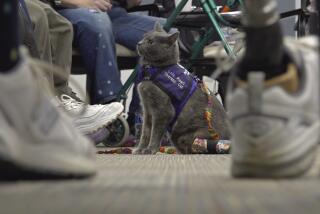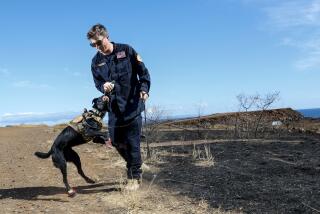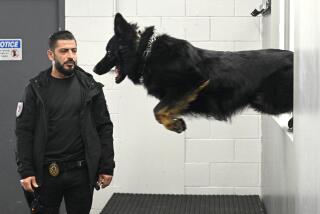Dogs Help Parkinson’s Disease Patients
- Share via
CHADDS FORD, Pa. — Louis Paulmier has suffered every indignity of Parkinson’s disease. He lost his athletic build and a face so handsome that friends called him “Beau.” Police once picked him up thinking he was drunk because he slurred his words.
Worst of all is the falling. Nearly 20 times each day he loses his balance and tumbles to the ground--a problem that neither medicine nor support groups, not even a Mexican faith healer could help.
Now he may have found a remedy in a burly animal named Melek, a Turkish herding dog who will be his support--a constant brace by his side to guard against falls.
Paulmier, 65, is among a small group in a program that pairs Parkinson’s sufferers with trained dogs. After three weeks together, Melek--an Akbash that stands about mid-thigh to Paulmier--is already making a difference in his life.
“Seeing him walk now, I can’t believe it,” said Paulmier’s wife, Marge. “He’s as surprised as anyone about the effect the dog has had.”
“Honestly, I was skeptical at first,” said Dr. Matthew Stern, a neurologist at Pennsylvania Hospital. “But when I went and saw what they could do for these patients, it made perfect sense. If these dogs can be someone’s eyes, why can’t they be their legs too?”
Doctors believe this is the first attempt to use the dogs against two problems caused by the progressive nervous disorder that drugs cannot solve: freezing and falling.
Freezing leaves a Parkinson’s victim temporarily paralyzed. Experts are unsure of the cause or how a dog can avert the sporadic attacks by placing a paw on a person’s foot.
“What happens when a patient freezes is unknown, what’s going on in their brain,” Stern said. “What we do know is that certain cues can make them break the spell,” including a dog’s touch.
A program run by Independence Dogs Inc., with sponsorship from the hospital and pharmaceutical company SmithKline Beecham PLC, has brought in the first group of Parkinson’s patients. The nonprofit group has trained dogs to assist people with a variety of muscular and spinal diseases for 13 years.
IDI is funded by charitable gifts and charges patients nothing for the dogs or the training program, except for a $200 fee for a harness.
Paulmier, a proud Quaker who taught physical education and health at Germantown Friends School in Philadelphia, fought the disease for years. At first he refused to acknowledge it--blaming his beard when friends noticed his slurred speech.
In 1973, he acknowledged he had the disease. He continued to drive. Each year, he and his wife went to Maine to work their 12-acre blueberry farm. He would make the one-hour trip through the woods to the Quaker meeting house. He even went surfing in Hawaii.
“Almost killed himself,” Marge Paulmier said.
More recently, his condition has worsened. On one trip through the Maine woods, he got lost and knocked on the door of a stranger’s home. They turned him away, thinking him drunk.
The falls have gotten worse, too, and he has been forced to face the toll the disease is taking. Watching a home video, he turned to his wife and said, “I can’t believe that old man is me!”
Besides helping with the falls and paralysis, Melek will also retrieve items for Paulmier.
Melek won’t return his muscular physique or his golf game, but the Paulmiers hope their companion will restore his master’s confidence. Already he walks better than he did with the two canes he brought to Chadds Ford. And he hardly fell at all last week.
More to Read
Sign up for Essential California
The most important California stories and recommendations in your inbox every morning.
You may occasionally receive promotional content from the Los Angeles Times.













